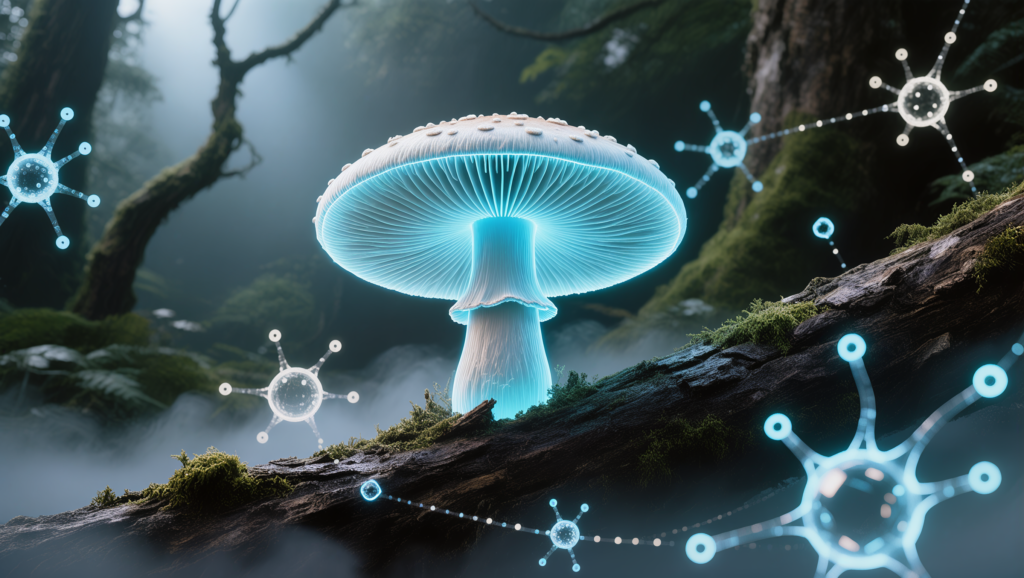Forget “miracle pills” and chemical cocktails. The future of mood health might be growing in the woods, peeking out from a forest floor or lining your local market’s produce section. Meet the mushroom that’s shocking researchers and challenging pharmaceutical giants: psilocybin-containing mushrooms (aka “magic mushrooms”). Combined with new findings on medicinal fungi like Lion’s Mane and Reishi, mushrooms are now at the forefront of natural mental health interventions—potentially standing toe-to-toe with conventional antidepressants.
Let’s dig into the science, the hype, and the realities, and see why so many are asking: could mushrooms really replace antidepressants?
Why Are Mushrooms Suddenly the Mood Marvel?
For decades, mainstream medicine relied on SSRIs and related drugs to battle depression. They work, but not for everyone—and often come with side effects and diminishing returns. Mushrooms, especially those carrying the compound psilocybin, have risen as powerful contenders because:
- They act on completely different neural pathways than SSRIs
- The effects can be rapid and long-lasting
- They can foster psychological connectedness and emotional healing
- Other medicinal mushrooms (Lion’s Mane, Reishi) support brain health in unique ways
Psilocybin: Nature’s Antidepressant?
What the Science Shows
A landmark 2024 study compared psilocybin (the active ingredient in magic mushrooms) directly to escitalopram, a common antidepressant. The findings were jaw-dropping:
- Both treatments improved depression scores over six months, but psilocybin offered extra benefits—improved social functioning, greater feelings of meaning and connection, and more psychological flexibility.
- Participants on psilocybin reported higher rates of well-being and life satisfaction vs. traditional SSRIs—despite only two doses, compared to daily medication for six weeks.
- Brain scans reveal psilocybin increases connectivity between regions. This “reset” helps people break out of rigid negative thought patterns, a hallmark of depression.
- FDA now calls psilocybin a “breakthrough therapy” for treatment-resistant depression.
“For the first time we find that psilocybin works differently from conventional antidepressants – making the brain more flexible and fluid, and less entrenched in the negative thinking patterns associated with depression.” — Imperial College London/UC San Francisco
Other Mushrooms for Mood: Not All Require a Trip
While psilocybin gets the headlines, mushrooms like Lion’s Mane (Hericium erinaceus) and Reishi (Ganoderma Lucidum) are earning respect as natural antidepressants—minus the mind-bending journey.
Lion’s Mane: The Brain Builder
- Boosts nerve growth: Lion’s Mane increases NGF (nerve growth factor), supporting neuron health and neuroplasticity—a major target for modern antidepressants.
- Reduces symptoms of anxiety and depression: Human and animal studies show Lion’s Mane relieves irritability, anxiety, and depressive feelings, possibly by reducing inflammation and enhancing hippocampal function. One study in menopausal women found Lion’s Mane cookies led to lower anxiety scores after just one month.
- Neurogenesis: Supports repair after injury and may aid recovery from brain injuries—likely improving overall emotional resilience.
Reishi: The Calming Adaptogen
- Reduces cortisol and stress: Reishi’s triterpenes help modulate the body’s stress response—calming the nervous system, reducing anxiety, and restoring sleep quality.
- Alleviates depression: Reishi contains compounds that influence the parasympathetic nervous system and GABA pathways—linked to relaxation and better sleep, which are key for mood recovery.
- Fights fatigue: Reishi is proven to relieve fatigue, a core symptom of depression, and is safe for long-term use.
How Do Mushrooms Compare to Traditional Antidepressants?
- Rapid Effects: Psilocybin and, to a lesser extent, Lion’s Mane/Reishi, produce benefits in days or weeks, whereas SSRIs can take 4–12 weeks for maximum impact.
- Fewer Side Effects: Clinical psilocybin trials report fewer side effects than SSRIs and a lower risk of withdrawal or tolerance.
- Deep Psychological Shifts: Participants describe breakthroughs in self-understanding, emotional release, and lasting changes—vs. symptom management alone.
- Brain “Reset”: Brain imaging shows increased neural flexibility after psilocybin, possibly underpinning long-term improvements in mood and outlook.
Risks and Realities: Not All Mushrooms Are Created Equal
- Psilocybin must be administered in safe, controlled settings; “magic mushrooms” are illegal in many countries and must not be self-administered for depression.
- Not everyone is a fit for psychedelic therapy—especially individuals with bipolar disorder, schizophrenia, or a history of psychosis.
- Some adverse reactions: Headaches, transient anxiety, and, rarely, “bad trips” can occur; clinical support reduces risks.
- Medicinal mushrooms like Lion’s Mane and Reishi are generally safe but should be purchased from reputable sources, and allergies or drug interactions are possible.
Getting Started: The Path Forward
- Psilocybin therapy is available only in regulated clinical trials or specialized clinics in some countries. It is NOT a DIY solution.
- Medicinal mushrooms like Lion’s Mane and Reishi can be integrated into the diet as teas, capsules, or powders—ideal for gentle, long-term mood support.
- Don’t ditch your current treatment without professional guidance. Mushrooms are promising, but integrating them safely is best done under the supervision of a mental health or medical professional.
The Bottom Line
Mushrooms, especially psilocybin-containing “magic mushrooms”, are poised to disrupt mental health treatment. The latest evidence shows two doses of psilocybin can rival—and often outperform—standard antidepressants across six months for many patients. Meanwhile, Lion’s Mane and Reishi offer subtler but substantial support for mood, neurogenesis, and stress relief—no trip required.
If you’re seeking alternatives to classic antidepressants, mushrooms may soon become a prescription—one rooted in nature, science, and a hopeful horizon for mental health.
Disclaimer: Always consult your healthcare provider before making changes to your depression treatment.







